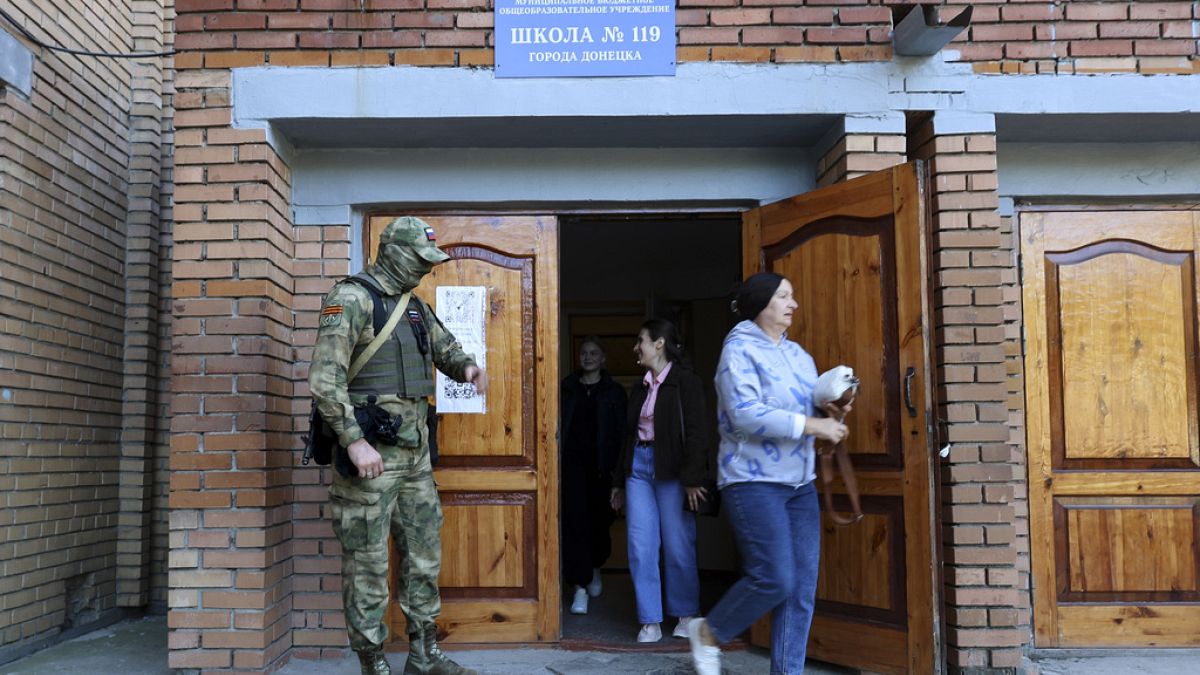Russian electoral officials on Sunday reported attempts to sabotage voting in the occupied regions, where guerrilla forces are loyal to Kyiv.
Guerrilla forces have previously killed pro-Moscow officials, blown up bridges and helped the Ukrainian military by identifying key targets.
Votes are taking place this weekend in 79 regions of Russia, with ballots for governors, regional legislatures, city and municipal councils, as well as in the four Ukrainian regions Moscow annexed illegally last year — the Donetsk, Kherson, Luhansk and Zaporizhzhia provinces — and on the Crimean peninsula, which the Kremlin annexed in 2014.
Balloting in the occupied areas of Ukraine has been denounced by Kyiv and the West as a sham and a violation of international law.
On Monday, the EU**condemned** the holding of the elections and said it would not recognise their results.
"Russia’s political leadership and those involved in organising them will face consequences of these illegal actions," the bloc's top diplomat Josep Borrell said in a statement.
The Council of Europe, the international human rights organisation, saidthat the “sham” elections could only be considered “null and void under international law.”
A drone strike in the early hours of Sunday destroyed one polling station in the Zaporizhzhia province, deputy chairman of Russia’s Central Election Commission Nikolai Bulaev told reporters. He said no staff were at the station at the time of the attack.
A Russian-appointed official in the neighbouring Kherson region said that a live grenade was discovered on Saturday near a polling station there. Marina Zakharova said the grenade was hidden in bushes outside the station, and that voting had to be halted while emergency services disposed of it.
Moscow has partially occupied Kherson and Zaporizhzhia since early in the war. Ukrainian forces have since retaken Kherson's namesake local capital, and are pressing a counteroffensive in Zaporizhzhia that has been making slow progress.
Local residents and Ukrainian activists have alleged that Russian poll workers make house calls accompanied by armed soldiers in both provinces, detaining those who refuse to vote and pressuring them into writing “explanatory statements" that could be used as grounds for a criminal case.
In Russia itself, Moscow Mayor Sergei Sobyanin’s seat is up for grabs, although he is running for re-election again and is unlikely to lose a race in which all contenders come from Kremlin-backed parties. Sobyanin was appointed mayor in 2010 and has since won mayoral elections twice: in 2013, despite now-imprisoned opposition leader Alexei Navalny running against him, and 2018. Governors in 20 other Russian regions are also vying for office this year.
In 16 Russian regions, voters are casting ballots for local legislatures. There are also multiple votes for city and municipal councils across the country and races for a few vacant seats in the State Duma, Russia’s lower house of parliament.
In the majority of the Russian regions and in the occupied regions of Ukraine, polls opened on Friday and the voting lasts for three days, concluding on Sunday. In other regions, voters can only cast their ballot on Sunday.
In over 20 Russian regions, including Moscow, online voting has been enacted, despite wide criticism by opposition figures who say it lacks transparency and could easily be rigged. It has also been made available in Crimea.
Ella Pamfilova, who heads Russia’s Central Election Commission, told reporters on Sunday that more than three million Russians in 25 regions have voted online. Pamfilova also said that over 20,000 cyberattacks were attempted on the online voting system on Friday and Saturday, without elaborating on their consequences.
There are hardly any exciting races, notes political analyst Abbas Gallyamov, mainly because “the most important issue in Russian politics — the issue of war and peace — is not on the agenda at all.”
“The voter feels that, the voter sees that it’s not interesting,” Gallyamov, who once worked as a speechwriter for Russian President Vladimir Putin, told The Associated Press in an interview.
He said no one wants to campaign in favour of the war because it is not popular and it would affect their poll ratings. At the same time, it is impossible to campaign against the war because "you will be barred from running, thrown in jail and named the enemy of the country. So all candidates avoid this issue.
"The voters feel that the elections are not about what is actually real and important. The turnout will be minimal. These are empty elections,” Gallyamov said.
